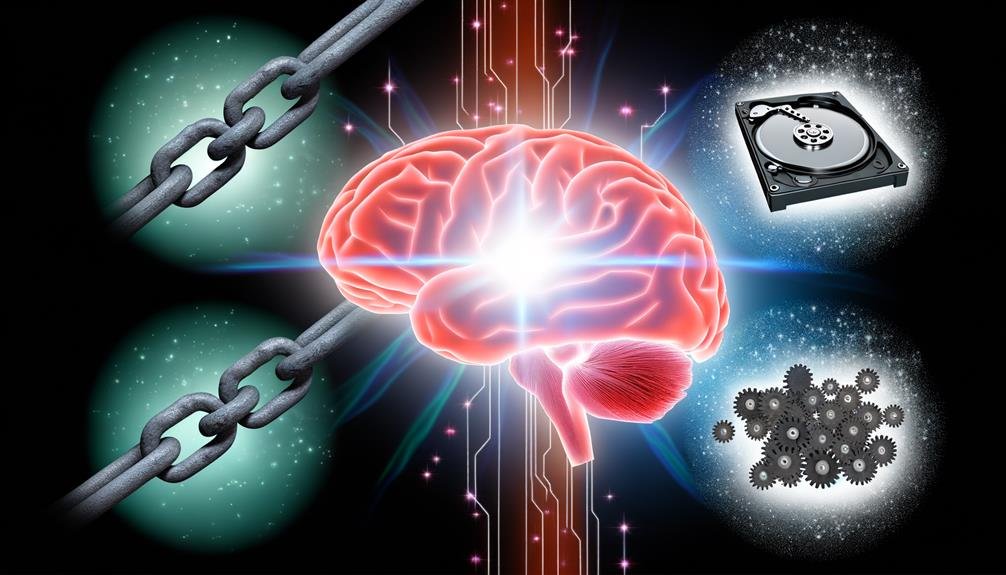Memory Retention Myths Debunked: Truths Revealed
Amidst the vast landscape of memory retention, numerous myths have taken root, shaping how we perceive the intricacies of cognitive processes.
However, in the quest for clarity and understanding, it becomes imperative to scrutinize these widely accepted beliefs. By dismantling these misconceptions and shedding light on the truths that lie beneath, a profound shift in perspective awaits those seeking a deeper comprehension of memory retention mechanisms.
Stay tuned as we uncover the veils of misinformation and illuminate the path towards a more nuanced understanding of how our minds retain and recall information.
Key Takeaways
- Memory retention myths lack scientific support and vary among individuals.
- Learning by doing and hands-on experiences enhance memory retention.
- Critical thinking is essential to bridge research with practical learning applications.
- Will Thalheimer's Work-Learning Research benefits professionals by applying evidence-based practices.
Common Memory Retention Percentage Myths
Have you ever wondered about the validity of common memory retention percentage myths frequently circulated in educational settings?
Despite widespread belief in fixed percentages like remembering only 10% of what we read, scientific research debunks these claims. Studies reveal a complex interplay of factors influencing memory retention, emphasizing individual variability.
The notion of a hierarchy in memory retention strategies is also misleading, as effectiveness varies among individuals. Misconceptions surrounding memory retention have perpetuated without empirical evidence, leading to ineffective learning practices.
Individual Variability in Memory Retention
Investigating the spectrum of memory retention capabilities across individuals reveals a nuanced landscape of cognitive processes and learning outcomes.
- Memory retention differences are influenced by various factors, including cognitive abilities, prior knowledge, and individual learning styles.
- Personalized learning approaches, tailored to an individual's strengths and weaknesses, can enhance memory retention and overall learning outcomes.
- Understanding the variability in memory retention highlights the importance of adapting teaching methods to cater to diverse learning needs, promoting more effective knowledge retention and application.
Order of Memory Retention Potency
The hierarchy of memory retention potency delineates the varying degrees of information retention across different learning contexts and stimuli. Memory recall plays a crucial role in understanding the order of memory retention potency, highlighting the effectiveness of retaining information over time.
Different learning stimuli can impact the order of memory retention potency, influencing the recall and retention effectiveness of the material presented. Scientific studies have shown that certain factors, such as relevance, emotional connection, and repetition, can influence the hierarchy of memory retention potency.
Understanding this hierarchy can aid in designing learning experiences that optimize memory recall and retention effectiveness, ultimately enhancing learning outcomes.
Misinformation in Memory Retention
In the realm of memory retention, pervasive misinformation hinders a clear understanding of the factors influencing effective recall and retention.
Memory Retention Misconceptions:
- Percentage Recall Myth: Claims like remembering only 10% of what is read lack scientific support.
- Individual Variability: Research demonstrates variations in memory retention capacities among individuals.
- Misinformation Legacy: Inaccurate beliefs about memory retention persist without credible evidence, perpetuating misconceptions in the field.
Learning by Doing Strategies
Utilizing experiential learning techniques is essential for enhancing memory retention and promoting effective knowledge acquisition in educational settings.
Hands-on workshops and experiential learning techniques are proven methods to engage learners actively in the learning process. By directly involving individuals in practical activities, such as simulations, experiments, and interactive exercises, memory retention is strengthened through cognitive engagement and physical involvement.
These strategies not only enhance understanding but also aid in long-term information recall. Research supports the effectiveness of experiential learning in improving retention rates and fostering a deeper comprehension of concepts.
Incorporating these hands-on approaches into educational curricula can significantly benefit learners by providing them with a more interactive and engaging learning experience.
Incorporating Real-Life Experiences
To enhance memory retention and deepen knowledge acquisition in educational contexts, incorporating real-life experiences is a pivotal strategy that promotes authentic and practical learning engagement. Hands-on learning experiences and practical applications are essential components for effective memory retention and knowledge transfer. By immersing learners in real-world scenarios, they can connect theoretical concepts to practical situations, reinforcing their understanding. This approach not only enhances memory retention but also cultivates critical thinking skills and problem-solving abilities. Incorporating real-life experiences in educational settings encourages active participation, engagement, and a deeper level of comprehension, ultimately leading to more meaningful and lasting learning outcomes.
- Hands-on learning experiences
- Practical application integration
- Active engagement in real-world scenarios
Importance of Evidence-Based Practices
Building on the foundation of incorporating real-life experiences to enhance memory retention and learning outcomes, the discussion now shifts towards emphasizing the critical role of evidence-based practices in optimizing educational interventions. Evidence-based learning involves the systematic application of well-researched and proven methods in educational settings, ensuring that teaching strategies are grounded in empirical data rather than anecdotal evidence. Research application in learning environments is paramount for fostering effective instructional design and enhancing student outcomes. The table below illustrates the significance of evidence-based practices in education:
| Importance of Evidence-Based Practices |
|---|
| Enhances Teaching Strategies |
| Improves Student Learning Outcomes |
| Guides Instructional Design |
| Ensures Educational Interventions are Effective |
| Establishes Credibility in Learning Practices |
Conclusion
In conclusion, the pervasive myths surrounding memory retention have been decisively debunked, revealing the true complexities of this cognitive process.
By shedding light on the individual variability in memory retention, debunking common misconceptions, and emphasizing evidence-based practices, a clearer understanding of memory retention has been elucidated.
This newfound knowledge will revolutionize learning strategies and engagement practices, paving the way for more effective educational outcomes.







